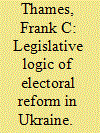| Srl | Item |
| 1 |
ID:
093717


|
|
|
|
|
| Publication |
2010.
|
| Summary/Abstract |
Until the 2007 Duma election, the Russian polity displayed several characteristics that should have allowed regional leaders to have an impact on deputies: a federalist system, an electoral system that encouraged regional representation, weak political parties, and regional leaders with electoral resources. Recent research on Russian mixed-member Duma elections argues that governors influenced the election of single-member district deputies. This raises the spectre that governors could have influenced the behaviour of these deputies. Using data from the third post-communist Duma, I demonstrate that single-member district deputies backed by regional leaders in the 1999 Duma election behaved differently from others in two critical areas: parliamentary party choice and support for the presidential legislative agenda. Governor support did not, however, affect committee choice.
|
|
|
|
|
|
|
|
|
|
|
|
|
|
|
|
| 2 |
ID:
154386


|
|
|
|
|
| Summary/Abstract |
Since the end of Communist rule, Ukraine has undertaken three major electoral reforms, moving from a single-member district majoritarian system, to a mixed-member system, to a closed-list proportional representation system, and back to the mixed-member system. Some argue that political parties are primarily motivated by the desire to maximise seats or improve their ability to impact on policy. I argue that existing theories of electoral reform often assume that parties are unitary actors during electoral reform. My analysis of electoral reform in Ukraine clearly demonstrates significant intra-party dissonance on electoral system preferences. This result questions the usefulness of the party unity assumption.
|
|
|
|
|
|
|
|
|
|
|
|
|
|
|
|